

Fiscal Policy and the Fiscal Cliff. Fiscal policy (economics. Economic News, US Economy News - Forbes.com. The European Debt Crisis: A Beginner's Guide. The European sovereign debt crisis!
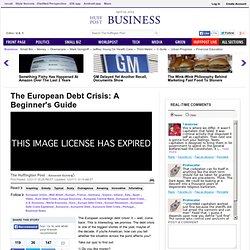
It -- wait, come back. This is interesting, we promise. The debt crisis is one of the biggest stories of the year, maybe of the decade. If you're American, how can you tell whether the situation across the pond affects you? Take our quiz to find out: 1) Do you like money? If you answered "yes" to either of the above, then the Europe situation probably has bearing on your life. (More of a picture person? In its most basic form, it's just this: Some countries in Europe have way too much debt, and now they risk not being able to pay it all back. There's more to it than that, of course, but when people talk about the "crisis," what they're worried about is that a big, scary, flashpoint event will happen -- like one or more of the eurozone countries defaulting on its debts -- causing investors to panic and triggering a massive banking shock.
The PIIGS took different paths to this scenario. The deficits weren't piling up everywhere. Introduction. How the EU works. The EU is a unique economic and political partnership between 28 European countries that together cover much of the continent.
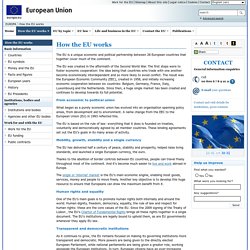
The EU was created in the aftermath of the Second World War. The first steps were to foster economic cooperation: the idea being that countries who trade with one another become economically interdependent and so more likely to avoid conflict. The result was the European Economic Community (EEC), created in 1958, and initially increasing economic cooperation between six countries: Belgium, Germany, France, Italy, Luxembourg and the Netherlands. Since then, a huge single market has been created and continues to develop towards its full potential.
From economic to political union What began as a purely economic union has evolved into an organisation spanning policy areas, from development aid to environment. The EU is based on the rule of law: everything that it does is founded on treaties, voluntarily and democratically agreed by all member countries. European Sovereign Debt Crisis Causes. Banking Highlights The Maastricht accords required low debt levels that euro-area countries ignored.Germany buckled down with its own reforms, while other countries had a party.Troubled countries regard Germany's austerity measures as bitter medicine.
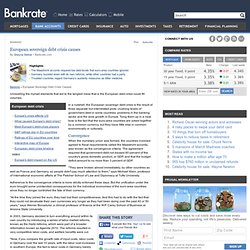
Banking » European Sovereign Debt Crisis Causes. What really caused the eurozone crisis? The European Debt Crisis: A Beginner's Guide. What Is Fiscal Policy? Fiscal policy is the means by which a government adjusts its spending levels and tax rates to monitor and influence a nation's economy. It is the sister strategy to monetary policy through which a central bank influences a nation's money supply. These two policies are used in various combinations to direct a country's economic goals. Here we look at how fiscal policy works, how it must be monitored and how its implementation may affect different people in an economy.
Introduction to the Economy, Fiscal and Monetary Policy. By: InvestorGuide Staff, dated January 25th, 2013 Behind almost every major market trend is some underlying economic factor.

From rising GDP growth rates to declining unemployment or the threat of inflation in Europe, economic trends are a major determinant of what happens to American companies and their stock prices. Along with corporate earnings, economic reports are the most watched regularly scheduled pieces of news. Almost every week there is an economic report that can help investors estimate what the future of the economy holds. This section will educate you about several basic, yet crucial economic concepts and will tell you the economic information that’s most important to you as an investor.
Fiscal Policy: Taking and Giving Away - Back to Basics: Finance & Development. Finance & Development Mark Horton and Asmaa El-Ganainy Governments use spending and taxing powers to promote stable and sustainable growth It’s raining coins (photo: Matt Cardy/Getty Images) Fiscal Policy. Fiscal policy is the use of government spending and taxation to influence the economy.
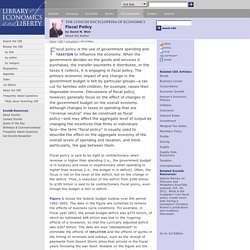
When the government decides on the goods and services it purchases, the transfer payments it distributes, or the taxes it collects, it is engaging in fiscal policy. The primary economic impact of any change in the government budget is felt by particular groups—a tax cut for families with children, for example, raises their disposable income. German Shows Budget Surplus in 2012 Despite Slow Growth. The German economy shrank by 0.5 percent in the fourth quarter of 2012 as a result of the euro crisis which hit exports and investment, preliminary figures released by the Federal Statistical Office on Tuesday showed.
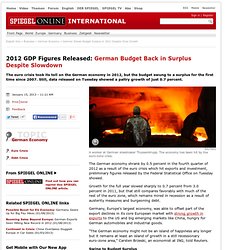
Growth for the full year slowed sharply to 0.7 percent from 3.0 percent in 2011, but that still compares favorably with much of the rest of the euro zone, which remains mired in recession as a result of austerity measures and burgeoning debt. Germany, Europe's largest economy, was able to offset part of the export declines in its core European market with strong growth in exports to the US and big emerging markets like China, hungry for German automobiles and industrial goods. Statistics and opinion polls.